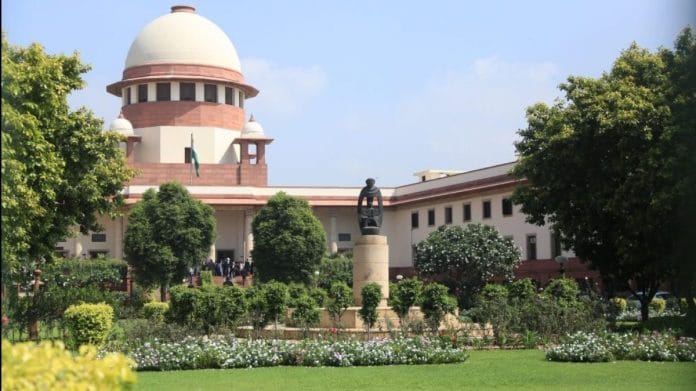New Delhi: The Supreme Court’s new system of transmitting its bail orders directly to prison authorities on the day it is pronounced will be launched once security audits make sure it cannot be breached and is safe for use, ThePrint has learnt.
On 16 July, Chief Justice of India N.V. Ramana had disclosed about the new system by which the court would instantly and electronically communicate its orders to jail authorities, so that those who are given bail do not have to wait for days before they are released.
“In this age of information and communication technology, we are still looking at the skies for the pigeons to communicate the orders,” the CJI had said while hearing a case on the delay in releasing 13 prisoners in Agra, even after they were granted bail. In February, stand-up comedian Munawar Faruqui was also released from an Indore jail a day after he was granted bail by the apex court in a case for allegedly hurting religious sentiments.
Speaking about rolling out a new system, the CJI had sought a comprehensive report on the project within two weeks.
Sources in the top court told ThePrint that the mechanism would entail emailing orders directly to the jail where the person who has been granted bail is lodged, as well as the district court under whose jurisdiction the prison is located.
As it involves judicial orders, the system has to be digitally secured from any sort of hacking, the sources said. Therefore, a security audit is necessary, they added.
There are over 1,300 jails in India and all have internet connectivity. “Similarly, even the district courts are today equipped with good internet connection. Therefore, emailing of orders the moment they are signed is the best way to make sure there is no delay in release of those given bail,” one of the officers quoted above said.
Also read: SC rejects Kerala govt’s plea to withdraw criminal cases against MLAs who vandalised assembly
How the new system will work
Under the proposed set-up, a unique user ID will be created for the authorised sender stationed at the Supreme Court, as well as for the person who will be responsible for receiving the mail at prisons and district courts.
“This will make sure only authorised persons are allowed exclusive access to this communication. Not everyone would be able to retrieve the orders sent through mails. This will fix accountability and prevent misuse of the system. The order would be e-mailed once it is digitally signed by the judges who deliver it,” the source explained.
In case the jail authorities want to double-check the authenticity of the mail, they will be able to do so with a special link provided to them in the same mail.
“Though all top court orders are posted on the official website of the Supreme Court, jail authorities on their part insist on producing a hard copy of the order for their personal satisfaction. They do not want to take risks as in today’s age websites can be hacked and cloned,” said another source.
Elaborating further, he added, the top court issues two types of bail orders. One lays down conditions for the release on bail, while the other requires the trial court hearing the case to issue bail stipulations.
To make sure there is no delay on the court’s part, in the second type of case, the apex court order will also be made available to the trial judge electronically. “The order will be sent to the district judge and it will be his or her duty to transmit it further to the judge concerned,” the source said.
Also read: ‘Failed’ law, ‘misused to stifle dissent’: Ex-SC judges speak out against UAPA, sedition, NSA
Past delays
Deliberations to have a direct communication channel with prison authorities began after an inexplicable delay on the part of Indore Central Jail to release stand-up comedian Munawar Faruqui got reported. Faruqui was released on the night of 6 February, a day after the top court granted him bail.
The Indore jail had reportedly refused to let him go on the day the SC ordered his release, on the grounds that it did not have a copy of the bail order. He was released only after the jail superintendent got an official confirmation from a top court registrar regarding the same.
After taking over as the CJI in April, Justice Ramana fast-tracked the process and also took it up on the judicial side.
His remarks on 16 July came while he was hearing a suo-motu case, registered at his initiative, on the delay on the part of Agra jail authorities in the release of 13 prisoners, despite the top court granting them bail.
The 13, who had been imprisoned for up to two decades even though the Juvenile Justice Board declared them as juveniles at the time of the crime, were granted bail on 8 July. However, they were set free only after four days, after being rebuked by the apex court bench that granted the bail.
(Edited by Poulomi Banerjee)
Also read: SC ensures Rs 88 lakh compensation for Bengaluru woman bedridden since 2006 school trip






